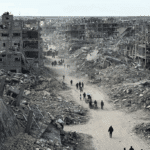Kinshasa, 22 February 2016 – Despite calls from the International Criminal Court (ICC), the Prosecutor to the High Military Court of Kinshasa requested to proceed immediately with the trial against former warlord Germain Katanga. ASF regrets this negative signal for the ICC.
Last Friday 19 February 2016, the High Military Court of Kinshasa heard the Military Prosecutor to determine whether the trial in the DR Congo against the former warlord, Germain Katanga, could proceed.
Mr. Katanga, alias Simba (lion in Swahili), is a former commander of the militia group Patriotic Resistance Force in Ituri (FRPI). In March 2014, the ICC sentenced him to 12 years’ imprisonment as an accomplice in crimes against humanity and war crimes committed in 2003 against the village of Bogoro (in Ituri province, Eastern Congo) and its inhabitants. When he was sentenced, Mr. Katanga had already served more than 6 years in provisional detention. Following a decision by the ICC in November 2015, his sentence was further reduced to two thirds of the original term.
Following Mr. Katanga’s wish to be neared to his family, he has been in the DRC since December 2015 to serve his sentence’s term.
Mr. Katanga was due to be released on 18 January. However, the Congolese authorities have continued to detain him following a decision from the Kinshasa Military Prosecutor’s Office to charge him with war crimes (enlisting and using children under 15 years of age), crimes against humanity (murders) and for his alleged participation to an insurrectional movement known as FNI/FRPI.
This situation is a test for the system put in place with the establishment of the ICC. “If a person who has been sentenced by the ICC is to be prosecuted by national authorities for other crimes, those authorities – in this case the Congolese authorities – ought first to obtain the approval from the ICC to start these prosecutions”, explains Jean-Philippe Kot, International Justice Expert with ASF. “This requirement is set out in the founding documents of the ICC to which the DRC has subscribed, but it is also a condition which was recalled in the agreement reached between the DRC and the ICC to allow Mr. Katanga to serve his sentence in that country”.
When the trial opened on 3 February, Mr. Katanga’s defence argued that the High Military Court did not have jurisdiction over his case because it failed to obtain the prior approval from the ICC to prosecute him. On 19 February, the Military Prosecutor rejected this argument and recommended the High Military Court to carry on the trial without further delay.
“This recommendation is highly regrettable. When the DRC agreed upon receiving Mr. Katanga on its territory for the service of his sentence, it renewed its commitment not to prosecute him for serious crimes committed before his transfer unless approved by the ICC”, explains Dominique Kamuandu, Fight Against Impunity Coordinator with ASF in DRC. “By requesting the High Military Court to proceed with the trial proceedings without waiting for this approval, the Military Prosecutor sends a very negative message for the international criminal justice mechanism which DRC had nonetheless subscribed to”.
The High Military Court of Kinshasa is not bound by this advice. Hopefully, this Court will heed the ICC’s decisions calling upon the Congolese authorities not to press ahead with the proceedings before receiving the ICC’s approval, if any. The High Military Court has not yet indicated the date of the delivery of its decision.
Whatever the outcome of this hearing will be, ASF, assisted by a Congolese lawyer and an international lawyer, has decided to observe this highly sensitive trial.
It will be about examining how the Congolese authorities will comply with their obligations both in relation to the ICC and in terms of trial fairness and of the rights of the accused.
G. Katanga is prosecuted along with two other defendants, Floribert Ndjabu Ngabu and Pierre Célestin Iribi Mbodina, two former members of the Front of Nationalists and Integrationists (FNI) – an organisation linked to the FRPI – who had given evidence during his trial before the ICC.
To get more information about this case, click here
Picture: Germain Katanga is a former commander of the militia group Patriotic Resistance Force in Ituri. ©ICC



